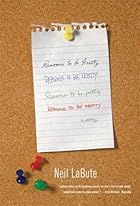
The Book: Reasons to Be Pretty: A Play
The Author: Neil LaBute
How I Found It: Was assigned a scene between Greg and Steph in my acting class and was intrigued.
The Review: After reading the scene I was given for my class, I had high expectations for this play-- I could really relate to the feelings Steph espoused to Greg, and it looked like an awesome play.
Now that I've read it, I'm not quite sure how I feel. It was good, but not all that enlightening or original. It felt much more cinematical than a play should have-- the scene in the food court, especially, I could picture happening on a sitcom.
The play concerns four people in their twenties: Greg, Kent, Steph, and Carly. We open on a fight between Greg and Steph, a vicious one: Steph has been told by Carly, her friend, about a remark Greg, her longtime boyfriend, made to Kent, Carly's husband, about how she is "regular" compared to another girl. Greg tries to explain what he meant, but Steph won't have it-- she's convinced he meant it as an insult, and maybe he did.
The remark leads to the dissolution of their relationship, and Steph and Greg have numerous confrontations, including an amusing one where she lists all the things she doesn't like about him. The play proceeds to show Greg's life after Steph left him, as he deals with Kent and Carly. Each of the four characters gets a soliloquy where they tell the audience their thoughts on things.
This was one of the problems I had with the play: when in conversation with each other, the characters speak perfectly normally, just like regular humans do. During the soliloquys, however, they become inexplicably elegant. A character that seems dumb as a rock in conversation suddenly spouts these brilliant insights, and it seemed really jarring to me. If there's one thing I hate in works of fiction, it's inconsistencies in characterization.
The play was also really vulgar-- a lot of swear words and scatological humor thrown around for really no reason, other than apparently wanting to be authentic to the sound of twentysomethings today. I mean, I'm not bothered by it, as I'm close to being a twentysomething myself and, yes, I can have a mouth on me when I want to (and when I'm writing), but it didn't need to be quite so excessive.
Overall, I give it a marginal recommendation to readers of plays. I'm interested in more of LaBute's work (specifically In The Company of Men and The Shape of Things) but I hope I'll be more impressed than I was with this one.




